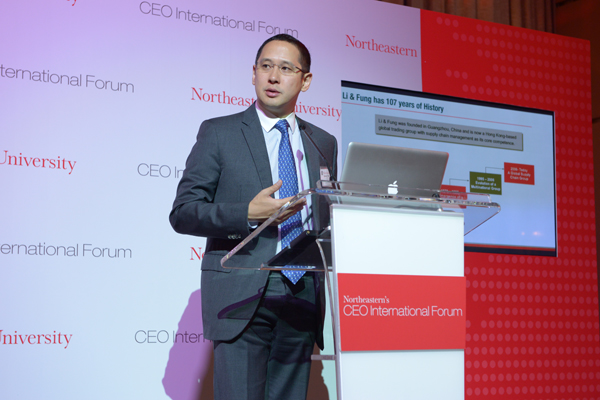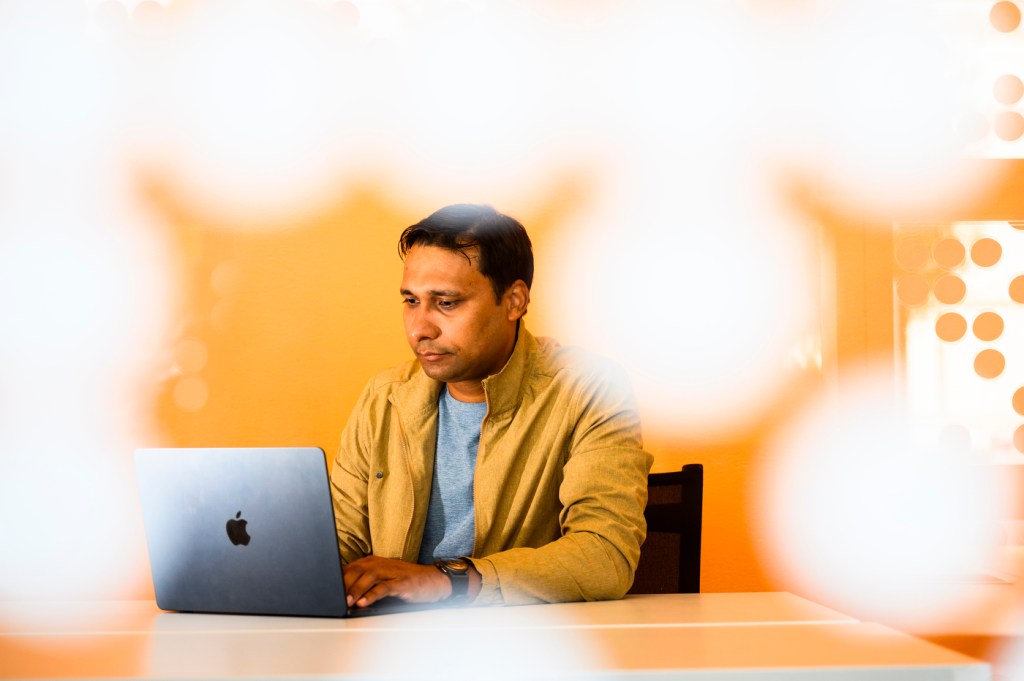How to deliver the goods in global business

Think about how you got the jeans you’re wearing. As the consumer, your role was pretty simple: You went to the store, tried them on, flashed the plastic, and left with your purchase. But that’s merely the tail end of a massive, complex global process that brought those jeans from initial design to manufacturing to the store where you found them.
Spencer Fung, PA’96, group chief operating officer and executive director of Li & Fung, is immersed in this intricate process. He heads up global infrastructure for Li & Fung, a multinational group headquartered in Hong Kong that engages in the design, development, sourcing, and distribution of consumer goods worldwide. The company manages end-to-end supply chains to connect more than 7,000 retailers and 15,000 suppliers globally through three business networks comprising trading, logistics, and distribution.
Fung, who is also a member of Northeastern’s Board of Trustees, spoke Wednesday at the university’s CEO Forum in Hong Kong.
In his talk titled “New paradigms in global sourcing,” Fung described how the family business was founded in 1906, its global expansion over generations, China’s labor force, and the challenges and opportunities facing the company today.
He said numerous factors shape the global sourcing arena, including the price of raw materials, wages, demographics, trade relations, and political and economic stability. This all makes for a multifaceted global supply chain that’s evolving daily and facing new challenges and opportunities—whether it be consumer trends or needs, regional trade agreements, protocols due to wage inflation, or safety measures following last year’s deadly collapse of a Bangladesh clothing factory.
“If you look at the global sourcing landscape, there is no constant. Almost every week you’re reacting to something,” Fung said. “You have to be nimble, fast, and flexible to be able to change almost on the fly. Otherwise you’ll have no goods to sell, and you’ll have no jeans to wear.”
In welcome remarks, Northeastern President Joseph E. Aoun referenced the impact Fung said his own international co-op experience had on his career. Aoun also lauded the opportunities Li & Fung has been providing Northeastern students with in Hong Kong. Northeastern is a global leader in experiential education anchored in its signature co-op program. Since 2006, students have completed experiential learning opportunities in 114 countries.
“We need to increase the opportunities for students to go overseas because we want them to be exploring the world and becoming global citizens,” Aoun said.

Northeastern President Joseph E. Aoun delivers opening remarks at Northeastern’s CEO Forum in Hong Kong. Photo by Om Events.
For his part, Fung’s job requires him to be closely in tune with the global business world, or risk Li & Fung falling behind its competitors. Along with keeping up with traditional factors that affect the global supply chain, Fung pointed to new forces coming into the fold. Social media has driven companies to be more transparent. The “fast fashion” trend has transformed the industry by dramatically shrinking the production cycle and forcing industry to churn out new clothing options much more quickly than ever before. And omni-channel retailing provides a seamless, integrated customer experience that today’s consumers expect.
Fung said predicting the impact of emerging factors isn’t easy; rather, the key is setting up an infrastructure that can react swiftly to them. To that end, he called 3-D printing “the biggest unknown.”
“Right now, it’s a hobby for enthusiasts or prototyping, but who knows about tomorrow?” he said. “I can imagine a day when there are factories in Mexico or North Carolina with thousands of 3-D printers mass producing products for the consumer and customizing everything. You can even do it at home. What will that do to global supply chains? There are huge social implications.”
In a Q-and-A following his talk, Fung fielded inquires on topics ranging from the work-life balance to family businesses. One attendee asked him to name the biggest competitive pressure facing his business. In response, Fung said, “Our industry is highly fragmented around the world. … As large as we are as a company, we have a small share of global sourcing. Competition is everywhere.” He added: “Being able to compete with these small- and medium-sized entrepreneurial quick-moving units is what we’re going against.”
Wednesday’s event coincided with the launch of Northeastern’s historic Empower campaign in Hong Kong. Launched one year ago, Empower: The Campaign for Northeastern University, is a comprehensive fundraising drive to secure $1 billion in support of programs and initiatives, with a particular focus on three strategic goals: student financial support and financial aid, faculty advancement and expansion, and innovation in education and research.





